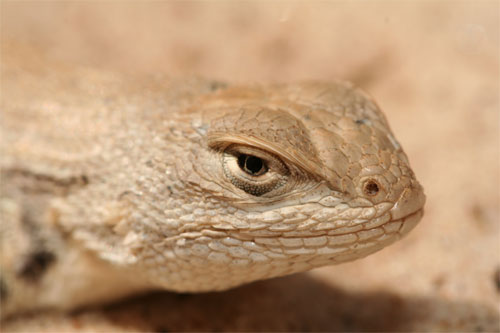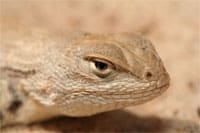The USFWS proposes that the dunes sagebrush lizard be protected under the Endangered Species Act.
The U.S. Fish and Wildlife Service (USFWS) has proposed that the dunes sagebrush lizard (Sceloporus arenicolus) be protected under the Endangered Species Act. The public has 60 days to comment on the proposal.

Photo courtesy USFWS
According to the U.S. Fish and Wildlife Service, the dunes sagebrush lizard (Sceloporus arenicolus) is in danger of extinction.
According to USFWS, the dunes sagebrush lizard is in danger of extinction across its entire range due to ongoing significant threats of habitat loss and fragmentation. These threats include oil and gas activities, as well as herbicide treatments. The removal of shinnery oak and creation of roads and pads, pipelines, and power lines for oil and gas development is a measurable factor impacting the dunes sagebrush lizard, according to USFWS.
In addition to other conservation and recovery efforts, the Endangered Species Act makes it illegal to kill, harm or otherwise “take” a listed species, or to possess, import, export or engage in interstate or international commerce of a listed species without authorization in the form of a permit from USFWS.
According to USFWS, the dunes sagebrush lizard is in need of critical habitat. Critical habitat is a specific geographic area considered essential for the conservation of a species. Critical habitat designation is an extra layer of protection that some species gain under the Endangered Species Act.
The dunes sagebrush lizard is found in southeastern New Mexico and west Texas. The dunes sagebrush lizard is native to small areas of shinnery oak dunes in these states, according to the USFWS. USFWS has not yet determined which area should be designated as critical habitat for the lizard.
USFWS is requesting comments or information from the public concerning the proposed ruling to list the dunes sagebrush lizard under the Endangered Species Act. According to USFWS, it will consider comments received or postmarked on or before Feb. 14, 2011. USFWS must receive requests within 45 days for public hearings, in writing, at the address shown below by Jan. 28, 2011. More information is available online.
For additional information, contact Wally “J” Murphy, Field Supervisor, New Mexico Ecological Services Field Office, 2105 Osuna NE, Albuquerque, NM, 87113; he can also be reached by phone at 505-761-4718 or fax at 505-346-2542. People who use a telecommunications device for the deaf (TDD) may call the Federal Information Relay Service (FIRS) at 800-877-8339.



